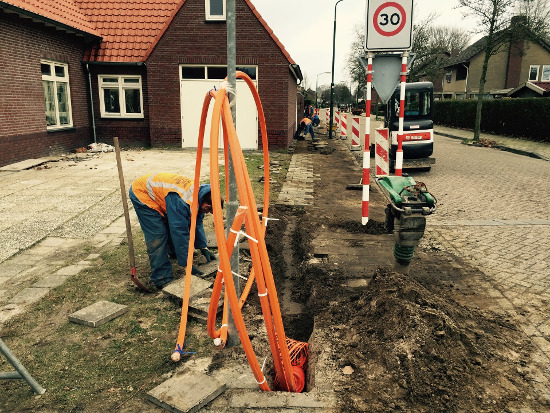Whoever is in office three years from now will have the biggest ever infrastructure debacle on their hands if we don't do something soon, writes Internet Australia's Laurie Patton.
According to the Australian Financial Review, the company building the National Broadband Network is about to lease two extremely expensive offices — one in Melbourne and one in Sydney.
That's rather old school thinking. NBN Co should be leading by example. One of the benefits of a digitally-enabled world is the ability to work remotely or to decentralise.
I'm not talking about sending everyone to Tamworth, like Barnaby Joyce, who wants to move one of his departments into his electorate. They could simply move out of the CBD, like most tech companies — especially the ones that are, like them, purely wholesalers.
They could move to another less expensive city, like Adelaide. Or, they could keep essential people in Sydney and Melbourne and decentralise others on a voluntary basis. There are plenty of techies moving to regional centres like Orange for example. In fact, one of Internet Australia's directors recently did this.
Companies across the United States have been decentralising their workforce for years. My sister-in-law is a senior executive with a large conglomerate and is based in Jacksonville, Florida — a city about the size of Perth.
Perhaps we need to offer financial incentives to get companies to decentralise. This would arguably be more economically viable than continuing to build more motorways and tunnels, and better health-wise than having people travelling for hours each day to get to and from work.
It's about embracing the future, not reinforcing the past. Not to mention saving taxpayer dollars.
NBN Just Got A $20 Billion Government Loan To Finish Its Rollout https://t.co/cgUk9sOzGj pic.twitter.com/0GkLwaJ7M5
— Gizmodo Australia (@GizmodoAU) November 18, 2016
When the rollout is completed in 2020, NBN Co will owe the Government about $19 billion. That's how much they recently borrowed and, on current revenue numbers, the best they can hope to do is service the interest bill. Plus, our globally recognised experts maintain that the 40 per cent or thereabouts of premises with FTTN will need to have their service rebuilt within five to ten years. That will cost billions and isn't budgeted for by NBN Co. So who will foot that bill?
Whoever is in office three years from now will have the biggest ever infrastructure debacle on their hands if we don't do something soon.
There are two main issues with the NBN:
- They're using ageing copper wires that can't deliver what many people want now, much less what we'll need in the future.
- The NBN wholesale pricing mechanism effectively penalises the retailers (RSP's) if they sell high speed packages (their profit margins are lower).
Internet Australia is calling on both sides to stop fighting and agree on a bipartisan strategy that will deliver #BetterBroadband.
Meanwhile, the complaints keep mounting, which is presumably why Communications Minister Mitch Fifield this week brought in the Australian Communications and Media Authority to do a review.

iTWire - NBN woes: Fifield asks ACMA to find out what's wrong https://t.co/GNiaTD079V
— Internet Australia (@internetAUS) August 1, 2017
Of course, it will only find what we already know. All the surveys show NBN customers are by and large unhappy.
Meanwhile the world is going fibre. Broadband, IPTV and VoIP market intelligence company Point Topic has found that nearly 80 per cent of new fixed broadband connections around the world are now fibre-to-the-premises (FTTP).
New Zealand has stuck with fibre. Over the past few years they've reduced their per premise rollout cost by more than 40 per cent. The same could have been done here. Across the ditch, they're laughing their heads off at our expense.
Laurie Patton is Executive Director of Internet Australia, the NFP peak body representing internet users and a chapter of the global Internet Society (www.internet.org). You can follow Laurie on Twitter @LJPatton.

This work is licensed under a Creative Commons Attribution-NonCommercial-NoDerivs 3.0 Australia License
EXCLUSIVE: Retail ISPs say NBN pricing model must change
— IndependentAustralia (@independentaus) August 3, 2017
By Dr Martin Hirst / @ethicalmartini https://t.co/Uh0EtYLOVR
Monthly Donation
Single Donation
IA interview with Laurie Patton
Get it online. Subscribe to IA.











